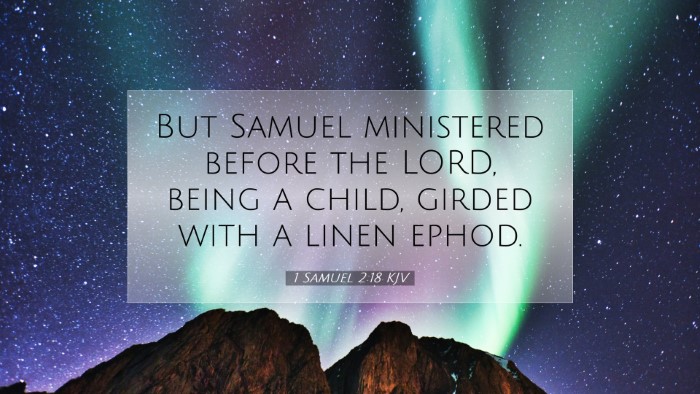Bible Commentary on 1 Samuel 2:18
Verse Reference: 1 Samuel 2:18 - "But Samuel ministered before the LORD, being a child, girded with a linen ephod."
Introduction
This verse highlights the early ministry of Samuel, emphasizing the contrast between his faithful service and the corruption of the priests of Eli. It sets the stage for understanding Samuel's role as a prophet and leader in Israel. Several public domain commentaries provide valuable insights into this significant scripture.
Contextual Background
The broader narrative of 1 Samuel narrates the transition of Israel from a theocracy to a monarchy. Samuel's role as a prophet is crucial as it intertwines with his early life in the temple under Eli's mentorship.
Matthew Henry's Commentary
Matthew Henry emphasizes that despite Samuel's youth, he was chosen by God for a distinctive purpose. He notes that "Samuel ministered before the LORD" illustrates not just a physical act but a spiritual commitment to God's service.
- Ministering as a Child: Henry points out that children can serve and honor God. Samuel's example encourages young believers to engage in ministry and divine service, regardless of age.
- Girded with a Linen Ephod: The ephod signifies his set-apart role, indicating that Samuel was viewed as a priestly figure even at a young age. It draws a connection to his unique calling and future role as a prophet.
Albert Barnes' Notes
Albert Barnes highlights the significance of Samuel's position and attire. He suggests that the linen ephod represents a divinely approved ministry, contrasting with Eli's corrupt household. Samuel’s clothing symbolizes purity and dedication.
- Symbol of Innocence: Barnes remarks that the linen ephod was a garment typically worn by the priests, denoting Samuel's innocence and the high calling placed upon him amid the prevalent corruption.
- Role Modeling: Barnes elucidates how Samuel serves as a role model for both children and adults in ministry. His diligence and purity become a standard against which future leaders in Israel, and indeed believers today, should measure themselves.
Adam Clarke's Commentary
Adam Clarke focuses on the implications of Samuel's early involvement in religious practices. He notes that young people have a role in godly service, and Samuel's life exemplifies this well.
- Importance of Early Training: Clarke points out that Samuel's training under Eli was vital. He encourages the notion that early spiritual formation can yield long-lasting impacts on individuals and communities.
- Ephod and Servanthood: He illustrates the ephod as a representation of servanthood, where Samuel's dedication is highlighted in contrast to the dishonor demonstrated by Eli's sons.
Theological Implications
The verse carries profound theological implications regarding the nature of divine calling and the character of true ministry. Samuel’s life as a servant of God is a pivotal reminder of the identity and integrity required in leadership.
Integrity in Ministry
In contrast to the wickedness of Eli's sons, Samuel's ministry serves as a beacon of hope and exemplifies the integrity necessary in spiritual leadership.
Call to Young Believers
This verse serves as a powerful encouragement to young believers, emphasizing that even at a young age, one can serve the Lord diligently and with commitment. The church ought to recognize and nurture the spiritual gifts of the young, allowing them to participate actively in ministry.
Conclusion
1 Samuel 2:18 encapsulates the essence of faithful service amid corruption and the importance of our early spiritual experiences. Commentators like Matthew Henry, Albert Barnes, and Adam Clarke provide profound insights that enrich our understanding, urging ministers and laypeople alike to pursue integrity and commitment in their own lives of service to God.


